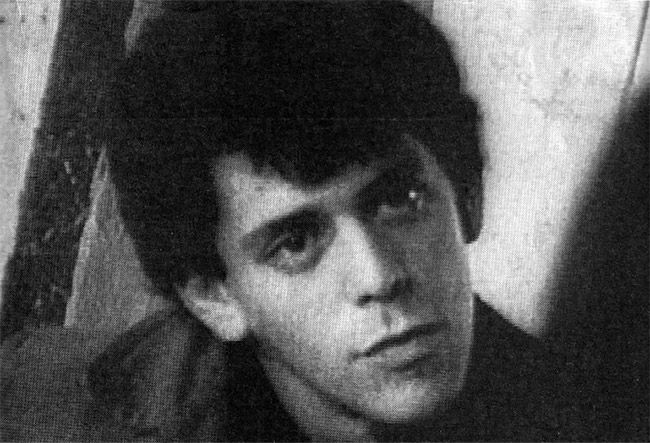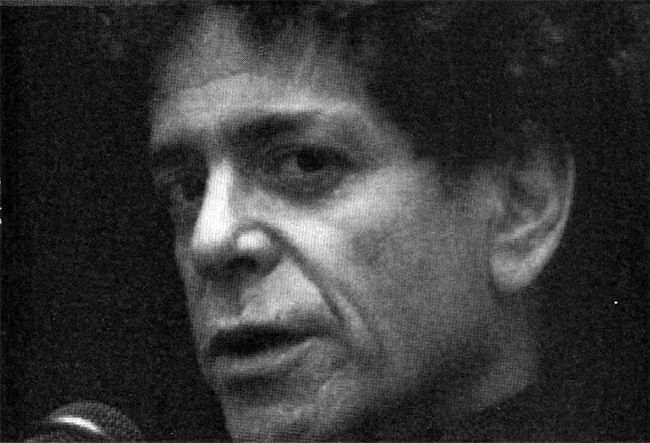Lou Reed

Lou Reed 1998
Portrait Diary
By Timothy Greenfield-Sanders in COVER Magazine, vol.12, no.3, 1998
May 11 1997: Start of production as Director and Producer of Lou Reed: Rock and Roll Heart, for Susan Lacy's "American Masters" series. Fly to Amsterdam with co-producer Karen Bernstein and Senior Researcher Karin Greenfield-Sanders to film Lou Reed and Robert Wilson production of Time Rocker.
June 4, 1997: First interview for the film: David Bowie in London.
Sept. 17, 1997: Start avid editing Lou Reed film with Jed Parker.
Dec. 24, 1997: Lou Reed film completed.
May 14, 1998: Lou Reed: Rock and Roll Heart opens at the Anthology Film Archive for a two week run.
Favorite Quotes from the Film
LOU REED: I was interested in subject matter that hadn't been covered in pop and rock. I had dreams of writing certain kinds of things. I was influenced by Burroughs and Ginsberg. Raymond Chandler and Hubert Selby, I thought. that's what I want to do except with a drum and guitar.
DAVID BOWIE: Lou Reed brought rock and roll into the avant-garde.
JOHN CALE: Lou was lyrically really incredible in a different sort of way. I think Lou created mythology on the street.
LOU REED: I think of New York as being something almost like my DNA. you know, I have my parents and then there's New York.
RONNIE CUTRONE: The 60's have a reputation of being, you know, totally cool; and the fact was there was 35 cool people in New York at the time, tops.
JIM CARROLL: The Velvet Underground was like the band but, as Lou once said, everyone thinks we're great but we don't have a pot to piss in.
DAVID BYRNE: l love the song "Walk On The Wild Side"...but I'd hear it on the radio all the time and you'd hear it in restaurants and bars and bus stations, whatever. And I'd wonder — do any of these people have any idea of what's being talked about, who is being talked about, and what's going on?
HOLLY WOODLAWN: I plucked my eyebrows, I shaved, I... you know, from one end of the country to the other...
JOE DALLESANRO: And you are still a very beautiful girl. Very beautiful girl.
THURSTON MOORE: To sing so explicitly about heroin, should be considered one of the most groundbreaking things in Rock and Roll. And it definitely was. I think lyric writing for a lot of people after that was never the same.
CHARLIE ROSE: How bad was it [drug use] at the worst?
LOU REED: Glam rock, androgyny, polymorphic sex. I was right in the middle of it. Some say I could have been at the head of the class.
I think really with Lou, the poet in him won out.
DAVID FRICKE: One thing I remember from the liner notes about that record [Metal Machine Music] — it was something like "my week beats your year" and I thought man, that is the shit, he's saying if you don't like it, I don't care.
VACLAV HAVEL: I know Lou Reed a long time as a musician and also personally and I like him very much. He and his Velvet Underground influenced very much the rock music in our country, which played in former time the special social role.
PATTI SMITH: One wants to communicate with the people... one wants to mind-meld with the people... but one must do their work and be the guardian of their work and I think really with Lou, the poet in him won out.
PHILLIP GLASS: It is not music that is made as a reaction to a particular market place. It really comes from the inside and by that I mean that it comes from Lou's own consciousness.

Reed 1998
